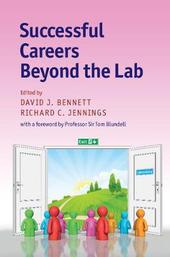
|
Successful Careers beyond the Lab
Hardback
Main Details
| Title |
Successful Careers beyond the Lab
|
| Authors and Contributors |
Edited by David J. Bennett
|
|
Edited by Richard C. Jennings
|
| Physical Properties |
| Format:Hardback | | Pages:366 | | Dimensions(mm): Height 235,Width 156 |
|
| Category/Genre | Life sciences - general issues
Engineering - general |
|---|
| ISBN/Barcode |
9781107161054
|
| Classifications | Dewey:502.3 |
|---|
| Audience | | Professional & Vocational | | Tertiary Education (US: College) | |
|---|
| Illustrations |
1 Tables, black and white; 1 Halftones, black and white; 3 Line drawings, black and white
|
|
Publishing Details |
| Publisher |
Cambridge University Press
|
| Imprint |
Cambridge University Press
|
| Publication Date |
15 June 2017 |
| Publication Country |
United Kingdom
|
Description
There is a major demand for people with scientific training in a wide range of professions based on and maintaining relations with science. However, there is a lack of good first-hand information about alternative career paths to research. From entrepreneurship, industry and the media to government, public relations, activism and teaching, this is a readable guide to science based skills, lifestyles and career paths. The ever-narrowing pyramid of opportunities within an academic career structure, or the prospect of a life in the laboratory losing its attraction, mean that many who trained in science and engineering now look for alternative careers. Thirty role models who began by studying many different disciplines give personal guidance for graduates, postgraduates and early-career scientists in the life sciences, physical sciences and engineering. This book is an entertaining resource for ideas about, and directions into, the many fields which they may not be aware of or may not have considered.
Author Biography
David J. Bennett is a Senior Member of St Edmund's College, Cambridge, and part natural part social scientist in both academia and companies. He has long-term experience, activities and interests in the relations between science, industry, government, education, law, the public and the media, and has spent the last twenty-five years running large, international, multidisciplinary, science-based projects. Richard C. Jennings is an Affiliated Research Scholar in the Department of History and Philosophy of Science at the University of Cambridge. His research interests are focused on the responsible conduct of research and the ethical uses of science and technology. He is an active member of Scientists for Global Responsibility and has worked with BCS, the Chartered Institute for IT, on a 'Framework for Assessing Ethical Issues in New Technologies'.
Reviews'This excellent book is directed at those for whom a conventional academic and research career is not necessarily their cup of tea. In it, you can learn how many other opportunities there are for scientists outside the usual academic route. The book is full of first-rate practical advice, emphasising the value of a self-assessment of your skills and interests, and illustrating that there is a major demand for people with training in science in many areas ranging from entrepreneurship and policy to PR and politics. Above all, do something you enjoy and believe is worthwhile, and do not consider yourself a failure because you have not continued in academic research.' Sir Walter Bodmer, Weatherall Institute of Molecular Medicine 'The enthusiastic and positive accounts in this book provide ample evidence that there is life beyond the lab, and that it can be a good life: rewarding, fulfilling and richly varied. To take that decision to go where the grass might be greener requires careful thought and the application of your best research skills - to research your own future. This book provides one major source of information, advice and a great range of personal words of guidance to help inform your next step.' Gordon Chesterman, University of Cambridge Careers Service '... offers students and early career scientists the indispensable personal experience of more than thirty skilled professionals who started out as academics and ended up in the most varied array of successful professions. Reading about the many routes that a scientist can choose, from becoming an EU-level regulatory expert and lobbyist, to a company founder and multi-millionaire, this book is not only insightful but also inspirational for those eager to branch out from the confines of their science. I wish I had had the opportunity of feasting my eyes on this a quarter of a century ago as I scratched my head as to which way to turn once I left the lab.' Nathalie Moll, European Association for Bioindustries, Belgium 'If there's one valuable message here it's 'know thyself - but don't dismiss serendipity'. While the advice of careers professionals to analyse skills and preferences is important, the personal stories show just how important it is to keep an open mind and that even the most successful career isn't really planned but relies on a willingness to grasp opportunities. For women, as a minority in the UK STEM workforce, these personal case studies offer reassurance that it's good to take risks and great careers await us all.' Averil Macdonald, OBE, University of Reading
|